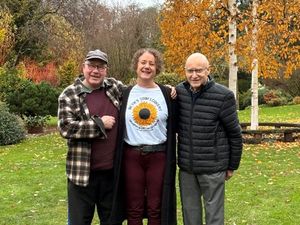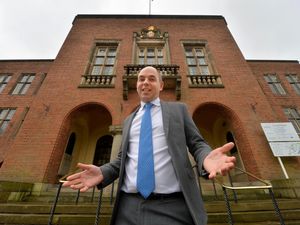Grandson at ceremony to mark shipping triumph
It is 80 years since Wolverhampton ship salvage expert Ernest Cox orchestrated one of the biggest ship rescues in maritime history.
It is 80 years since Wolverhampton ship salvage expert Ernest Cox orchestrated one of the biggest ship rescues in maritime history.
Nestled on a sea bed some 70 feet deep, people told him it was impossible to raise the 28,000 ton German battleship SMS Hindenburg from where it had sunk in June 1919.
But scrap dealer Mr Cox did not believe anything was impossible. And ship by ship, the German fleet, which had sunk at the Royal Navy port of Scapa Flow in the Orkneys, was raised.
Now, a plaque has been unveiled at the site to commemorate Mr Cox's amazing feat.
Members of his family, including his grandson Jon Moore, travelled to Orkney to witness the unveiling. Mr Moore, aged 74, who lives in Salisbury, said: "It was a very proud day for us.
"I took a great deal of interest in what he was doing."
The grandfather-of-two added: "Everyone told him he couldn't do it. The government told him he was daft. But he didn't listen. He went up there and offered an undisclosed fee.
"He'd never raised a ship in his life and then he was pulling up little vessels at the rate of one a fortnight and then he pulled up the majority of the big heavy stuff.
"It was an amazing thing he did."
Most of the ships raised were then sold off for scrap. Mr Cox was born in 1883 in a small house in Pool Street, Wolverhampton, and left the Dudley Road Free School as a teenager to join his father's drapery business.
Machinery always fascinated him and after working as a munitions maker during the First World War, he went on to set up Cox and Danks in Oldbury, specialising in breaking up old warships for scrap metal.
Between 1924 to 1931, Cox's men set up a work base at Scapa Flow and raised a total of 32 warships.
SMS Hindeburg proved difficult to raise and had to be lowered several times before being successfully salvaged on July 27 1930.
Mr Cox died in 1959 at the age of 76.
The plaque was unveiled at his former works on July 30, in a ceremony attended by seven of his family members.





